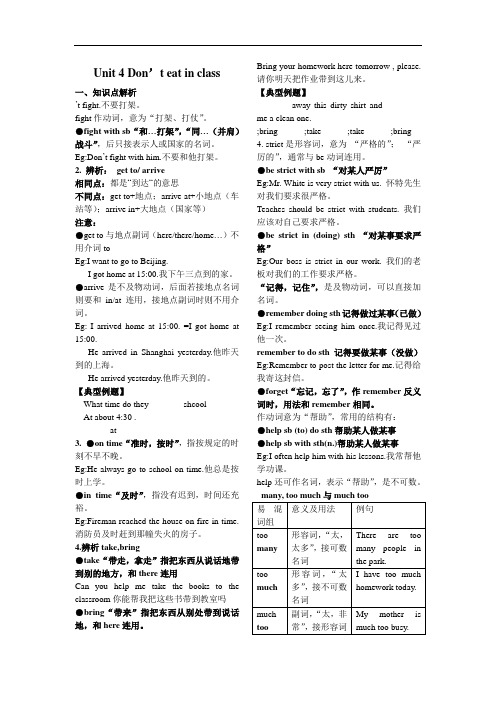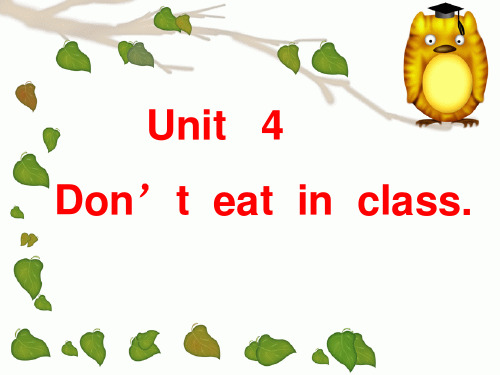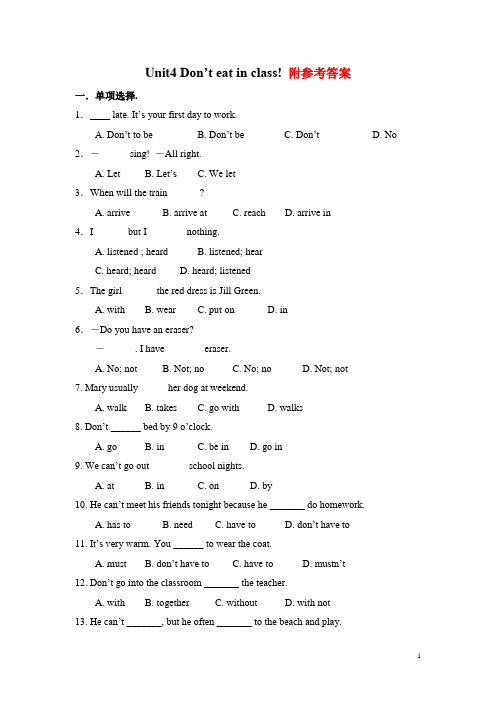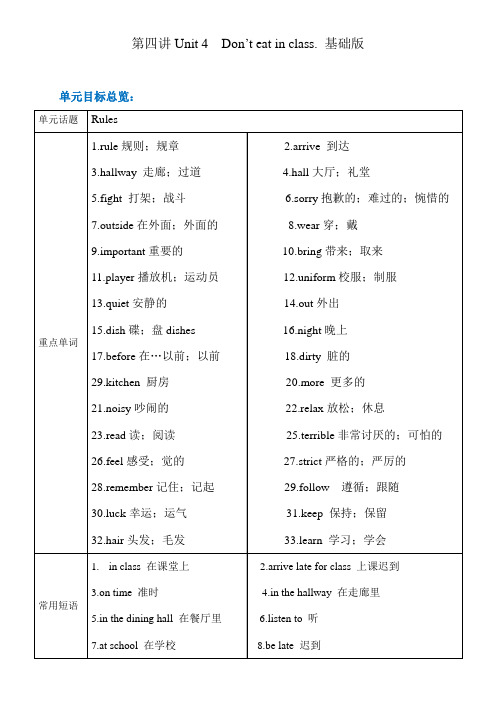Unit_4_Don't_eat_in_class知识点解析及练习题
Unit_4_Don27t_eat_in_class知识点解析及练习题

Unit 4 Don’t eat in class一、知识点解析’t fight.不要打架。
fight作动词,意为“打架、打仗”。
●fight with sb“和…打架”,“同…(并肩)战斗”,后只接表示人或国家的名词。
Eg:Don’t fight with him.不要和他打架。
2. 辨析:get to/ arrive相同点:都是“到达“的意思不同点:get to+地点;arrive at+小地点(车站等);arrive in+大地点(国家等)注意:●get to与地点副词(here/there/home…)不用介词toEg:I want to go to Beijing.I got home at 15:00.我下午三点到的家。
●arrive是不及物动词,后面若接地点名词则要和in/at连用,接地点副词时则不用介词。
Eg: I arrived home at 15:00. =I got home at 15:00.He arrived in Shanghai yesterday.他昨天到的上海。
He arrived yesterday.他昨天到的。
【典型例题】---What time do they________shcool---At about 4:30 .at3. ●on time“准时,按时”,指按规定的时刻不早不晚。
Eg:He always go to school on time.他总是按时上学。
●in time“及时”,指没有迟到,时间还充裕。
Eg:Fireman reached the house on fire in time.消防员及时赶到那幢失火的房子。
4.辨析take,bring●take“带走,拿走”指把东西从说话地带到别的地方,和there连用Can you help me take the books to the classroom你能帮我把这些书带到教室吗●bring“带来”指把东西从别处带到说话地,和here连用。
Unit4_Don't_eat_in_class复习

SectionB Summary: • 1.Talk about family rules • 2.have/has • have to /must
Can you list the rules of the Jones family?
the Jones family
Don’t talk loudly at home. 1. _______________________ Don’t watch TV late at night. 2. _______________________
1.Don’t r____ un in the hallways. 2.Don’t a____ rrive late for the meeting. 3. He likes singing and dancing.(否定句) He doesn’t like singing or dancing. break rules 4.在外面吃饭 eat outside keep /obey rules 5.学校规章制度 school rules 6.上课迟到 be / arrive late for class in class 7.在课上 8.和某人打架 have a fight with sb./ fight with sb. 9.arrive—arrives—arriving—arrived 10.fight— fights—fighting—fought
6. _______________________ Don’t play the guitar late at night.
用have to或has to填空 1.We have to clean our classroom after school. has to 2.She make her bed after getting up. has to 3.It’s late. Mr Beckman go to work by car. 4.Emily and Peter join a music club. have to They practice guitar every day.
Unit_4_Don't_eat_in_class

Unit4 Don’t eat in class!附参考答案一.单项选择.1.____ late. It’s your first day to work.A. Don’t to beB. Don’t beC. Don’tD. No 2.-______sing! -All right.A. LetB. Let’sC. We let3.When will the train ______?A. arriveB. arrive atC. reachD. arrive in4.I ______ but I _______ nothing.A. listened ; heardB. listened; hearC. heard; heardD. heard; listened5.The girl ______ the red dress is Jill Green.A. withB. wearC. put onD. in6.-Do you have an eraser?-______. I have _______ eraser.A. No; notB. Not; noC. No; noD. Not; not7. Mary usually _____ her dog at weekend.A. walkB. takesC. go withD. walks8. Don’t ______ bed by 9 o’clock.A. goB. inC. be inD. go in9. We can’t go out _______ school nights.A. atB. inC. onD. by10. He can’t meet his friends tonight because he _______ do homework.A. has toB. needC. have toD. don’t have to11. It’s very warm. You ______ to wear the coat.A. mustB. d on’t have toC. have toD. mustn’t12. Don’t go into the classroom _______ the teacher.A. withB. togetherC. withoutD. with not13. He can’t _______, but he often _______ to the beach and play.A. swimming, goB. swim, goesC. swims, goesD.swim, go14. Does she always wear _______?A. uniformB. sneakerC. a uniformD. a sneaker15. There are ________ rules in our class.A. many tooB. too muchC. much tooD. too many16. Tom never ________ fun at home.A. have muchB. has anyC. have anyD. has many二.句型转换。
人教版 Unit 4 Don't eat in class知识点 + 练习讲义设计(无答案)

You________ ________do your homework every day. 4.He has to get up before 6:10 every morning.( 改为一般疑问句,并作肯定回答 ) —________he________ ________get up before 6:10 every morning? —________,he________. 5.They have to wash their hands before meals.( 对画线部分提问 ) ________ ________they________ ________ ________before meals?
~ to do sth . 记得去做某事 ~ dI never have any fun. (never 译为“从来没有”,表示否定,否定句中表示“任何,一些”,用 any)
13. 表示“时间”的词组: (1) 下课后:after class 放学后:after school (2) 在上学的白天/晚上:on school days/nights 比较:at night
3. You don't ______wash all the plates after meals.
A.have to B.must C,may
D.has to
5.---Must I clean the window now?
---No,you_______.
A.musn’t B.needn’t C.can’t 四、按要求完成句子,每空一词 1.Mike has to clean his bedroom at home.( 改为否定句 ) Mike________ ________ ________clean his bedroom at home. 2.You must do your homework every day.( 改为同义句 )
初中英语人教版七年级下册Unit 4 Don’t eat in class知识点整理

七年级英语下册Unit4知识点【Useful expressions】1.No talking 不许讲话 (No+动词ing,禁止......)2.the school rules 校规3.eat in class 上课吃东西4.run in the hallways 在过道上追逐打闹5.in the dining hall 在食堂6.fight with sb.=have a fight with sb.和某人打架7.go out on school nights 在上学期间的晚上外出8.on school days 在上学的日子9.arrive late for class= be late for class 上课迟到了10.wear a/the uniform 穿制服11.have to 不得不;必须12.eat outside 外面吃东西13.practice doing sth.练习做某事14.help mom make breakfast 帮助妈妈做早饭17.too many 太多(+可数复数)18.too much 太多(+不可数)19.so many 如此,这么多的(+可数名词复数)20.so much 如此,这么多的(+不可数名词)21.library rules 图书馆规则22.be strict with sb.in sth.在某方面对某人严格23.be quiet 安静24.be noisy 吵闹25.make the teacher unhappy 惹老师不高兴26.make a noise/make noises 制造噪音27.do the dishes 洗碗28.stay at home呆在家里29.on time 准时30.in time 及时31.learn to do sth.学习做某事32.learn from sb.向某人学习33.follow / keep /obey the rules 遵守规定34.break the rules 破坏规则35.make rules 制定规则36.keep one’s hair short 留短发37.think about 考虑38.make one’s bed 铺床39.in your home 在你家40.at home 在家41.Good luck to you! 祝你好运42.remember doing sth.记得做过某事43.remember to do sth 记得去做某事44.listen to sb.听某人说【Target sentences】1.--What are the rules?--Well, you must be on time for class.Don't fight with your classmates.2.We can’t listen to music in the classroom or hallways.3.--Can we bring music players to school?--Yes, we can./No, we can’t.4.And we always have to wear the school uniform.5.--Does he have to wear a uniform at school?--Yes, he does./No, he doesn't.6.--What do you have to do?--We have to be quiet in the library.7.Don't leave the dirty dishes in the kitchen.8.My dad says I can’t play basketball after school because I must do my homework.9.After dinner, I can’t relax,either.I must read a book before I can watch TV.10.I know how you feel.11.There are a lot of things you can do.12.Parents and schools are sometimes strict but remember, they make rules to help us.13.I think it’s best to follow the rules.14.I can’t go out on school nights.15.I have to do my homework after school.16.I must practice the guitar before dinner.【Language points】1.Don’t arrive late for class.(1)arrive v.到达;是不及物动词,若接地点名词,要加介词in或at。
人教版英语七年级下册-Unit-4-Don't-eat-in-class-语法解析

2021/2/4
1
6
疑问句: must 提前,回答时注意一二人称的互换。肯定用 must, 否定用needn’t. e.g. --Must I go home now?
-- Yes, you must. -- No, you needn’t.
B: And I must clean my room every Saturday. =?
A: Wow, you do have a lot of rules!
2021Dr. Know, There are too many rules! At 6:00 a.m. my mom says, “Get up now and make your bed!”
too many rules “太多的规定”, 其中too many 用来 修饰可数名词复数rules。 e.g. He has too many friends to meet.
修饰不可数名词时, 要用too much e.g. We have too much work to do.
much too 太……much 用来增强语气。后接形容 词或副词。
What can I do. Dr. Know? Molly Brown, New York
表“看”的单词?
either 也。用于否定句和疑问句中。肯定句中用too 表也。
watch,see,look r,read
2021/2/4
1
13
Dear Molly, I know how you feel. People always tell us, “ Don’t do this!” or “You can’t do that!” But think about it, Molly. There are a lot of things you can do. You can play basketball on weekends. You can watch TV after you read a book. Parents and schools are sometimes strict,
Unit 4 Don't eat in class.语法、练习题及答案

Unit 4 Don’t eat in class.一、祈使句祈使句指的是表示命令、请求、建议或劝告的句子。
其主语you常省略,谓语动词用原形,句末用感叹号或句号,读降调。
1. 肯定的祈使句(1)动词原形+其他Stand up, please. = Please stand up. 请起立。
(2)Be + n./adj.Be a good boy! 要做一个好孩子!Be careful! = Look out! = Take care! 小心/ 当心!(3)Let + 宾语+ 动词原形+ 其它成分Let me help you. 让我来帮你。
Let’s go to school together. 咱们一起上学去吧。
2. 否定的祈使句(1)Don't + 动词原形Don't stand up. 别站起来。
Don't be careless. 别粗心。
Don't let them play with fire. 别让他们玩火。
(2)Let型的否定式有两种:“Don't + let + 宾语+ 动词原形+ 其它成分”和“Let + 宾语+ not + 动词原形+ 其它成分”。
Don't let him go. / Let him not go. 别让他走。
Let them not play with fire. 别让他们玩火。
(3)no开头,用来表示禁止性的祈使句。
No smoking! 禁止吸烟!No fishing! 禁止钓鱼!3. 祈使句的强调形式,通常在肯定祈使句式前加上助动词Do。
例如:Do shut up! 快住口!4. 祈使句的回答祈使句的动作通常是表示将来发生的动作,所以回答祈使句时,一般用will或won’t。
在回答具有否定意义的祈使句时,要注意两点:(1)形式一致(即Yes与will保持一致;No与won’t保持一致)(2)意思相反(即Yes是“不”的意思;No是“是”的意思)。
人教版英语七年级下册Unit4Don’teatinclass.知识点及课后作业

第四讲Unit 4 Don’t eat in class. 基础版单元目标总览:【知识点详解】1、Don’t arrive late for class.上课不要迟到。
1)arrive 意为“到达”。
arrive at+小地点,arrive in +大地点。
◆I will arrive in Beijing next week. 我下周到北京。
◆I arrived at the small village on a cold morning. 在一个寒冷的早晨我到达了那个小村庄。
2)arrive 后面跟地点副词here, there, home时,不需要跟介词。
◆arrive home 到家arrive here 到这儿2、You must be on time.你必须准时。
(1)on time&in timeon time 意为“按时,准时”,指按照规定的时间或者指定的时间做某事;而in time指“及时”,指不迟到或在规定的时间之前或者接近所规定的时间做某事。
◆We must arrive there on time. 我们必须按时到达那里。
At last, the police arrived there in time. 最后警察及时赶到了那里。
(2)must情态动词,意为“必须”,不能单独做谓语,必须和动词原形以其构成谓语;其后接动词原形;其否定形式mustn’t意为“禁止,千万不要”◆I must do my homework before dinner.晚饭前我必须做完作业。
3、Don’t listen to music in class.不要再课堂上听音乐。
(1)listen 是不及物动词,意为“听,倾听”,强调听的动作,后面接宾语时要加上介词to。
◆We should listen to the teacher carefully. 我们应该认真听老师讲课。
◆Listen! Someone is singing in the garden. 听! 有人在花园里唱歌。
- 1、下载文档前请自行甄别文档内容的完整性,平台不提供额外的编辑、内容补充、找答案等附加服务。
- 2、"仅部分预览"的文档,不可在线预览部分如存在完整性等问题,可反馈申请退款(可完整预览的文档不适用该条件!)。
- 3、如文档侵犯您的权益,请联系客服反馈,我们会尽快为您处理(人工客服工作时间:9:00-18:30)。
Unit 4 Don’t eat in class一、知识点解析1.Don’t fight.不要打架。
fight作动词,意为“打架、打仗”。
●fight with sb“和…打架”,“同…(并肩)战斗”,后只接表示人或国家的名词。
Eg:Don’t fight with him.不要和他打架。
2. 辨析:get to/ arrive相同点:都是“到达“的意思不同点:get to+地点;arrive at+小地点(车站等);arrive in+大地点(国家等)注意:●get to与地点副词(here/there/home…)不用介词toEg:I want to go to Beijing.I got home at 15:00.我下午三点到的家。
●arrive是不及物动词,后面若接地点名词则要和in/at连用,接地点副词时则不用介词。
Eg: I arrived home at 15:00. =I got home at 15:00.He arrived in Shanghai yesterday.他昨天到的上海。
He arrived yesterday.他昨天到的。
【典型例题】---What time do they________shcool?---At about 4:30 p.m.eB.goC.arriveD.arrive at3. ●on time“准时,按时”,指按规定的时刻不早不晚。
Eg:He always go to school on time.他总是按时上学。
●in time“及时”,指没有迟到,时间还充裕。
Eg:Fireman reached the house on fire in time.消防员及时赶到那幢失火的房子。
4.辨析take,bring●take“带走,拿走”指把东西从说话地带到别的地方,和there连用Can you help me take the books to the classroom?你能帮我把这些书带到教室吗?●bring“带来”指把东西从别处带到说话地,和here连用。
Bring your homework here tomorrow , please.请你明天把作业带到这儿来。
【典型例题】________away this dirty shirt and ________ me a clean one.A.Take;bringB.Take;takeC.Bring;takeD.Bring;bring4. strict是形容词,意为“严格的”;“严厉的”,通常与be动词连用。
●be strict with sb “对某人严厉”Eg:Mr. White is very strict with us. 怀特先生对我们要求很严格。
Teaches should be strict with students. 我们应该对自己要求严格。
●be strict in (doing) sth “对某事要求严格”Eg:Our boss is strict in our work. 我们的老板对我们的工作要求严格。
5.remember“记得,记住”,是及物动词,可以直接加名词。
●remember doing sth记得做过某事(已做)Eg:I remember seeing him once.我记得见过他一次。
remember to do sth 记得要做某事(没做)Eg:Remember to post the letter for me.记得给我寄这封信。
●forget“忘记,忘了”,作remember反义词时,用法和remember相同。
6.help作动词意为“帮助”,常用的结构有:●help sb (to) do sth帮助某人做某事●help sb with sth(n.)帮助某人做某事Eg:I often help him with his lessons.我常帮他学功课。
help还可作名词,表示“帮助”,是不可数。
【典型例题】I have ________skirts and this one is ________small for me, so you can take it if you like.A. too many; too muchB. too much; much tooC. too many; much tooI don’t like her, ________.A.alsoB.tooC.eitherD.to10.have fun=have a good time 玩得开心,玩得愉快.9.No talking ! "禁止交谈。
"no后面加上名词或动名词doing也表示不要做某事。
与don't +do的用法相似。
Eg:No wet umbrellas! / Don't put wet umbrellas here! 禁止放湿雨伞No food! Don't eat food here! 禁止吃食物 No smoking! Don't smoke here! 禁止吸烟三、重点语法1.情态动词have to 的用法:意思是"必须、不得不" 它侧重于客观上的必要和外界的权威。
●结构:have/has to do sth.不得不做某事●一般现在时:主语是第三人称单数时用has to,其它时候用have toEg:We have to wear sneakers for gym class. 在体育课上 我们必须穿运动鞋。
Tom has to practice the guitar every day. 汤姆每天必须练习弹吉它。
(I had to get up at 5:00 am last Monday. 上周一我不得不早上5点起床。
)●否定形式:主语+don't have to+动词原形+其他●一般现在时:主语是第三人称单数时用doesn't have to,其它时候用don't have to. Eg:Nick doesn't have to wear a uniform. 尼克不必穿制服。
We didn't have to do our homework at once. 我们不必马上完成作业。
●疑问句:Do 、Does或Did+主语+have to +动词原形+其他Eg:---Do you have to stay at home on weekends? 周末你必须呆在家里吗---Yes, I do. / No, I don't. 是的 我必须。
不 我不必。
Did he have to go to bed by 11:00 last night? 昨晚 他不得不11点前上床睡觉吗?【典型例题】Lucy has to wear sports shoes for gym class.(该为否定句)Lucy ________ ________ to wear sports shoes for gym class.2.情态动词must的用法:must表示说话人的主观看法,及主观上的必要性,还用于命令或愿望。
只用于现在时,无人称和单数的变化。
在表示有做某一个动作的必要和义务,它的意思是“必须,应该”。
Eg:You must finish your homework fist.你必须先完成作业。
以must开头的一般疑问句,它的否定回答用needn’t(不必要),不用mustn’t(不允许),mustn’t常用于否定句中表示“不允许,禁止”。
Eg:---Must I go there on foot?我必须得走过去吗?---No,you needn’t.不,你不需要。
You mustn’t park your car here.你的车不允许停在这儿。
【典型例题】It’s very warm outside.You ________wear thecoat.A.have toB.hadn’tC.don’t have toD.mustn’t3.情态动词can的用法:●表示能力:"会""能",在第上册中已经学习这种用法Eg:Can you play the guitar? 你会弹吉它吗 Judy can speak a little Chinese. 朱蒂会说一点中文。
I can dance and sing. 我能唱歌又能跳舞。
●表示允许、许可:"可以"、"能" 即在这一课中新学的词义Eg:Can the students run in the hallways? 学生们可以在走廊上跑吗We can eat outside. 我们可以在外面吃东西。
Can I come in? 我能进来吗●注意:同样是情态动词can 和have to 的用法是有区别的,和大部分情态动词一样,can在否定句中直接在can后加上not;在疑问句中把can放到主语前面,并且没有人称和数的变化,而have to 是有相应变化的,详情请参照上一条。
【典型例题】The children ________play football on the road.A.canB.mustC.mustn’tD.may---Must I clean the blackboard?---No,you ________.A.needn’tB.mustn’tC.can’tD.may notYour mother ________there,she has gone to America.A.must beB.could beC.may beD.can’t be4. 祈使句(Imperative Sentence)●定义:用于表达命令、请求、劝告、警告、禁止等的句子叫做祈使句,祈使句最常用于表达命令,因此在学校文法中也常称为命令句。
●祈使句因对象(即主语)是第二人称,所以通常都省略。
祈使句的动词都为一般现在时,句末则使用句号或感叹号来表示结束。
●祈使句的肯定句:行为动词原形+其他Eg:Go and wash your hands.去洗你的手。
——命令Watch your steps.走路小心。
——警告Look out!Danger!小心!危险!——强烈警告,已如感叹句No Swimming.禁止游泳。
——禁止●其中,以Let开头的祈使句,Let后宾语是是第一人称时,否定形式是在宾语后加not,Eg:Let’s not do that again.我们别再那样做了。
